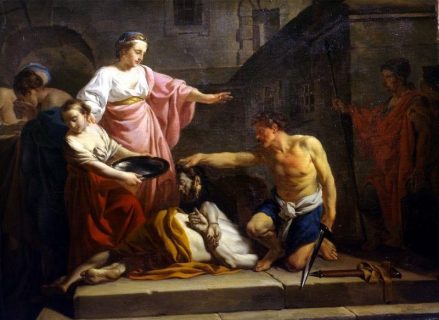Progressive reflections on the lectionary #26
Monday 15th July 2024
Mark 6:14-29 - Enter the villain

The gospel passage this week, which narrates the story of the death of John the Baptiser, takes us into the world of, arguably, the biggest villain of the Jesus tradition: Herod Antipas.
It’s regrettable, perhaps, that the books of the Maccabees are not considered canonical in the Protestant tradition. The Catholics consider the first two books of the Maccabees to be part of the canon, while different Orthodox traditions consider the third and fourth books canonical too. The usefulness of these books, in my opinion, is that they help fill in some of the otherwise blank space between the events of the Hebrew scriptures, and the world of the New Testament, the late second temple period. In other words they help us to understand the genesis of the Hasmonean dynasty helps, which culminates, in the time of Jesus, in the rule of Herod Antipas and his brothers.
But that’s all just homework, because this passage deals directly with Antipas and the goings on in his household.
In Mark’s gospel the great metanarrative conflict is not between God and Satan, as some might seek to argue, but between Jesus and Antipas, and the conflict is about who, ultimately, is the real ‘king’ (or lord, ruler, etc.)
The first big linguistic hint comes in this passage, in Mark 6: 14 when Herod Antipas is referred to as ‘basileus’, a term that means king, emperor, or something of that sort - basically it’s a political title, and refers to the person with authority over a certain physical place. Elsewhere in the gospels, other than in one instance, Antipas isn’t given this title (mainly because that isn’t actually his actual title).
The writer of ‘Mark’, though, uses the word a dozen times, and on five of those occasions (all in chapter 6) he uses it to refer to Herod Antipas. In six further instances (all in chapter 15), it is used to refer to Jesus. The contest in Mark is over who deserves this title - I think you may know who Mark favours.
The battle over who is ‘political’ king is not only ‘earthly’, of course. The family name ‘Herod’ comes from a Greek word which resolves as ‘hero’ - and has connotations of demi-god status. In other words, a Herod is not just a claimant to earthly authority, but to heavenly authority too - he (or she) is royal, heroic and divine - just like Jesus.
But of course, Herod Antipas is not a good guy. In this story ‘Mark’ depicts him as weak and fearful as well as corrupt, law breaking, and sinister, he is the anti-hero. References to Herod Antipas crop up here and there in the gospels, some more or less distinct than others - perhaps having eroded over time.
A good example of this is the parable of the ten minas in Luke, which seems like another version of the parable of the talents, but has some key differences. In both parables, it is the giver of the talents who is the villain, and those who resist him meet a terrible fate - all oppressed communities can identify with the reality of this. I feel the need to reiterate that way of reading these stories given that the opposite message tends to get preached too often.
But in the story of the ten minas, where a man of noble birth goes abroad to get political power, we see a version of the true story of Antipas and his brother, Archelaus - who came to power after the death of Herod the Great 4 BCE.
Prior to his death Herod the Great named his son Archelaus as King, and his other sons Antipas and Philip as ‘tetrarchs’ - which is a ruler of a lesser area. But ultimate authority comes from Rome, so after the death of his father Archelaus hot footed it to Rome to get the seal of approval from Caesar Augustus. Antipas set off too, to try and overturn the decision, and get the title of king for himself. Ultimately the whole family would go over to try and sort it out.
After some argy-bargy Caesar Augustus eventually decided to award Archelaus the title of ‘ethnarch’ rather than king, while Antipas was given the title of tetrarch and given authority over the territories of Galilee and Perea. Not far off a win for Antipas, I suppose, but sort of a loss too - but in any case it all showed how much the Herods depended on the patronage of Caesar.
It was the game of thrones style shenanigans of the Herods that formed the backdrop for the early Jesus movement, a movement which was as much political as it was spiritual - those ideas of rulership weren’t separate. Here, in the story of how Antipas had John killed because his wife (illegally acquired) wanted him dead for calling out the illegality of the marriage, we get a glimpse of the vicious, violent and corrupt world of the antihero. This is the one who Jesus would refer to as ‘that fox’ and whose development of the sea of Galilee (newly renamed Lake Tiberias) would form the context of the majority of Jesus’ anti establishment mission.
This blog is taken from Simon's Substack email series, to subscribe please go to https://simonjcross.substack.c...
Image: ‘The Beheading of John the Baptist’ by Jean-Baptiste Marie Pierre, Public domain, via Wikimedia Commons


Comments